CARBON SPONGE NETWORKS
Carbon Sponge has been building networks of carbon farmers since 2020. We first formed the Affiliates group in 2020-2021 in New York City and subsequently the Carbon Sponge Hub for small-scale farmers in the Hudson Valley and Catskills regions.
**NEW REPORT**
DOWNLOAD: Stewarding Soil Carbon with the Carbon Sponge Hub
This report follows the Carbon Sponge Hub in 2024, highlighting our Hub farmers across the Hudson Valley. The report includes five case studies, data collected with analysis, and action points for regenerative sorghum farming on small farms. The project was funded by the Northeast Sustainable Agriculture Research and Education (SARE) Farmer Grant Program.
![]()
The Carbon Sponge Hub @ White Feather Farm (2022-2024) started with six small farms in Hudson Valley and the Catskills: Foxtrot Farm and Flowers, Mossy Stone Farm, Newton Farm, Nimble Roots Farm, White Feather Farm, and Zena Farmstead.
In 2023, we expanded to 10 farms, bringing on board Bonhomie Farm, Stoneberry Farm, Sweet Freedom Farm, and The Lo Farm.
In 2024, we focused on 5 farms (returning and new members) with the goals of scaling up sorghum production, experimenting with culinary uses for sorghum harvest, and verifying our Kit for field testing in collaboration with the Cary Institute of Ecosystem Studies. This was in part funded by a Northeast SARE Farmer’s Grant and The Spark of Hudson
In 2025, we moved our headquarters to Wally Farms in Ancram, NY, where we continue to develop protocols specific to the Hudson Valley farming community for building carbon storage while fine-tuning distributed grain production of 1-2 acres per location.
![]() White grain sorghum harvested, close up.
White grain sorghum harvested, close up.
Our focus has been on growing sorghum since 2022 for a couple of reasons. Most of the Hub farms were unfamiliar with sorghum, and it is not a common crop in our region. Carbon Sponge started growing sorghum in NYC as part of our cover mix in 2018 and has also participated in The Land Institute’s perennial breed trials.
Sorghum is a grain originally from East Africa that is resilient in heat, drought, floods, and various soil types (including nutrient-poor and contaminated). The plant has incredible biomass and deep roots, terrific characteristics for carbon storage. The plant is a stunner – it litearlly stops people in their tracks. Lastly, sorghum is known to accumulate silica in its tissue that can bind with carbon to stabilize it.
Harvesting the sorghum for grain and/or syrup while returning the rest of the biomass to the ground allows us to feed the soil and our communities at the same time.
![]() Jalal of Sweet Freedom Farm with Katharhy and Anne-Laure of Carbon Sponge, 2023.
Jalal of Sweet Freedom Farm with Katharhy and Anne-Laure of Carbon Sponge, 2023.
![]() Tyler of Mossy Stone Farm inspecting sorghum midseason in 2022.
Tyler of Mossy Stone Farm inspecting sorghum midseason in 2022.
![]()
Ryan of Zena Farmstead running Microbiometer test on his farm with Koji, 2022.
![]() Christine of Nimble Roots Farm collecting soil data, 2022.
Christine of Nimble Roots Farm collecting soil data, 2022.
Carbon Sponge Affiliates in NYC was active for two seasons (2020-2021). The group included: Bronx River Foodway (Bronx), GrowNYC Teaching Garden (Governor’s Island), NYU’s Urban Farm Project (Manhattan), Pioneer Works (Brooklyn), Prospect Farm (Brooklyn), and Red Hook Farms (Brooklyn). Over the two years, the Affiliates members in NYC tested the Carbon Sponge Kit and data collection protocols in their existing green spaces, discussed ecological farming practices as they pertain to an urban context, and analyzed results together.
![]() Farmer Brendan at Red Hook Farms, 2020.
Farmer Brendan at Red Hook Farms, 2020.
![]() Farmer Justin at Red Hook Farms collecting soil data, 2020.
Farmer Justin at Red Hook Farms collecting soil data, 2020.
![]() GrowNYC Affiliates testing with the kit on Governors Island, 2021.
GrowNYC Affiliates testing with the kit on Governors Island, 2021.
**NEW REPORT**
DOWNLOAD: Stewarding Soil Carbon with the Carbon Sponge Hub
This report follows the Carbon Sponge Hub in 2024, highlighting our Hub farmers across the Hudson Valley. The report includes five case studies, data collected with analysis, and action points for regenerative sorghum farming on small farms. The project was funded by the Northeast Sustainable Agriculture Research and Education (SARE) Farmer Grant Program.

The Carbon Sponge Hub @ White Feather Farm (2022-2024) started with six small farms in Hudson Valley and the Catskills: Foxtrot Farm and Flowers, Mossy Stone Farm, Newton Farm, Nimble Roots Farm, White Feather Farm, and Zena Farmstead.
In 2023, we expanded to 10 farms, bringing on board Bonhomie Farm, Stoneberry Farm, Sweet Freedom Farm, and The Lo Farm.
In 2024, we focused on 5 farms (returning and new members) with the goals of scaling up sorghum production, experimenting with culinary uses for sorghum harvest, and verifying our Kit for field testing in collaboration with the Cary Institute of Ecosystem Studies. This was in part funded by a Northeast SARE Farmer’s Grant and The Spark of Hudson
In 2025, we moved our headquarters to Wally Farms in Ancram, NY, where we continue to develop protocols specific to the Hudson Valley farming community for building carbon storage while fine-tuning distributed grain production of 1-2 acres per location.
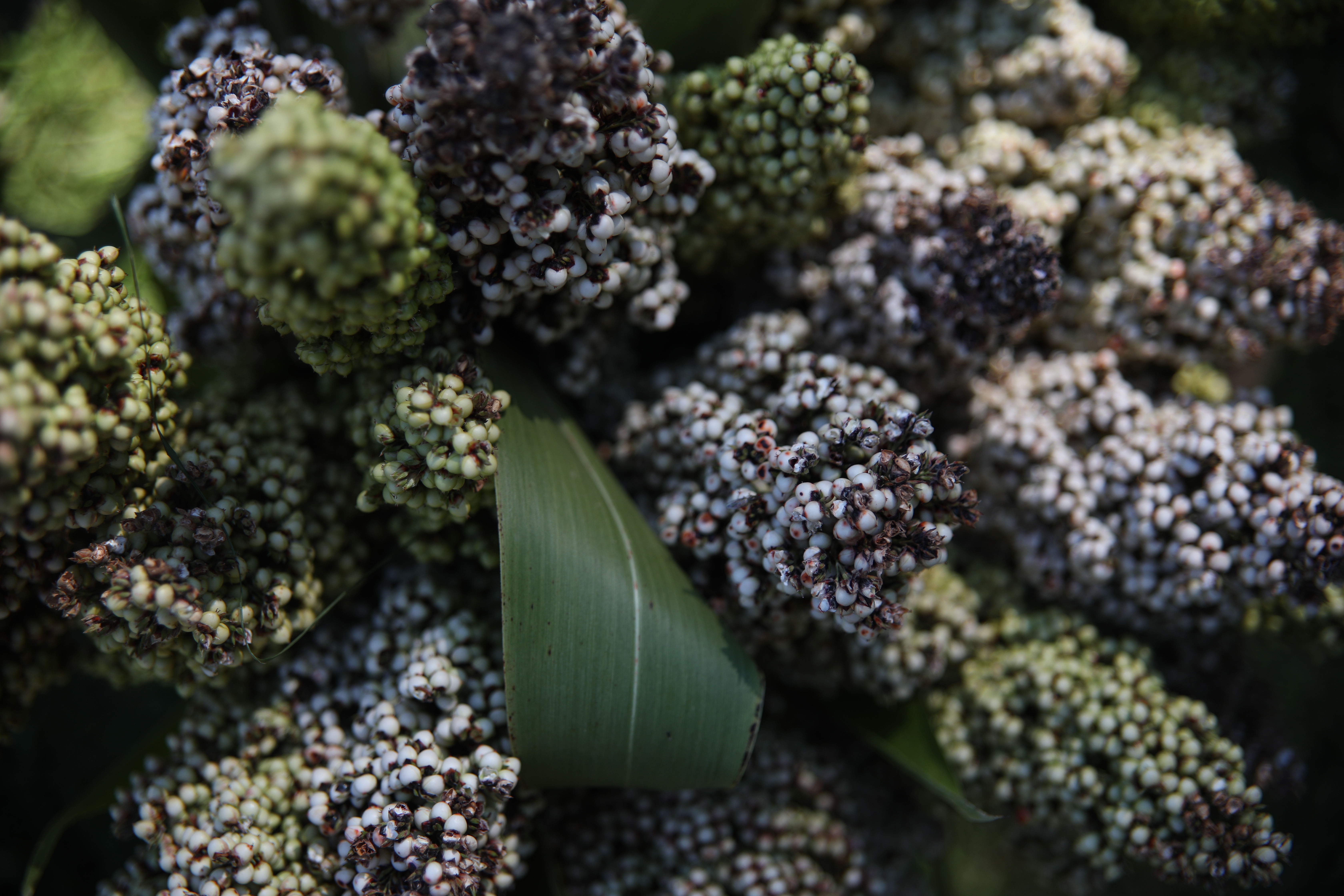 White grain sorghum harvested, close up.
White grain sorghum harvested, close up.Our focus has been on growing sorghum since 2022 for a couple of reasons. Most of the Hub farms were unfamiliar with sorghum, and it is not a common crop in our region. Carbon Sponge started growing sorghum in NYC as part of our cover mix in 2018 and has also participated in The Land Institute’s perennial breed trials.
Sorghum is a grain originally from East Africa that is resilient in heat, drought, floods, and various soil types (including nutrient-poor and contaminated). The plant has incredible biomass and deep roots, terrific characteristics for carbon storage. The plant is a stunner – it litearlly stops people in their tracks. Lastly, sorghum is known to accumulate silica in its tissue that can bind with carbon to stabilize it.
Harvesting the sorghum for grain and/or syrup while returning the rest of the biomass to the ground allows us to feed the soil and our communities at the same time.
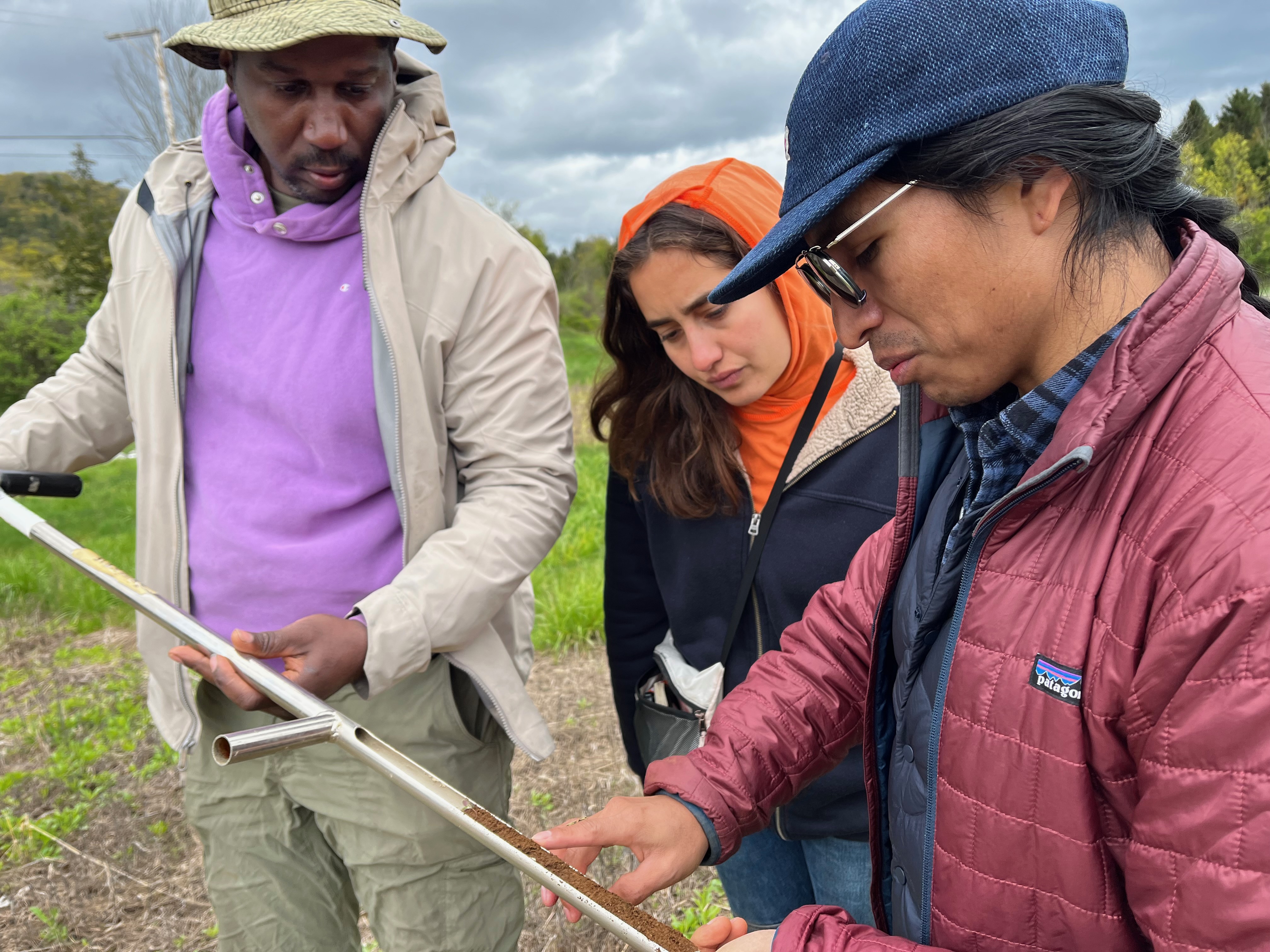 Jalal of Sweet Freedom Farm with Katharhy and Anne-Laure of Carbon Sponge, 2023.
Jalal of Sweet Freedom Farm with Katharhy and Anne-Laure of Carbon Sponge, 2023.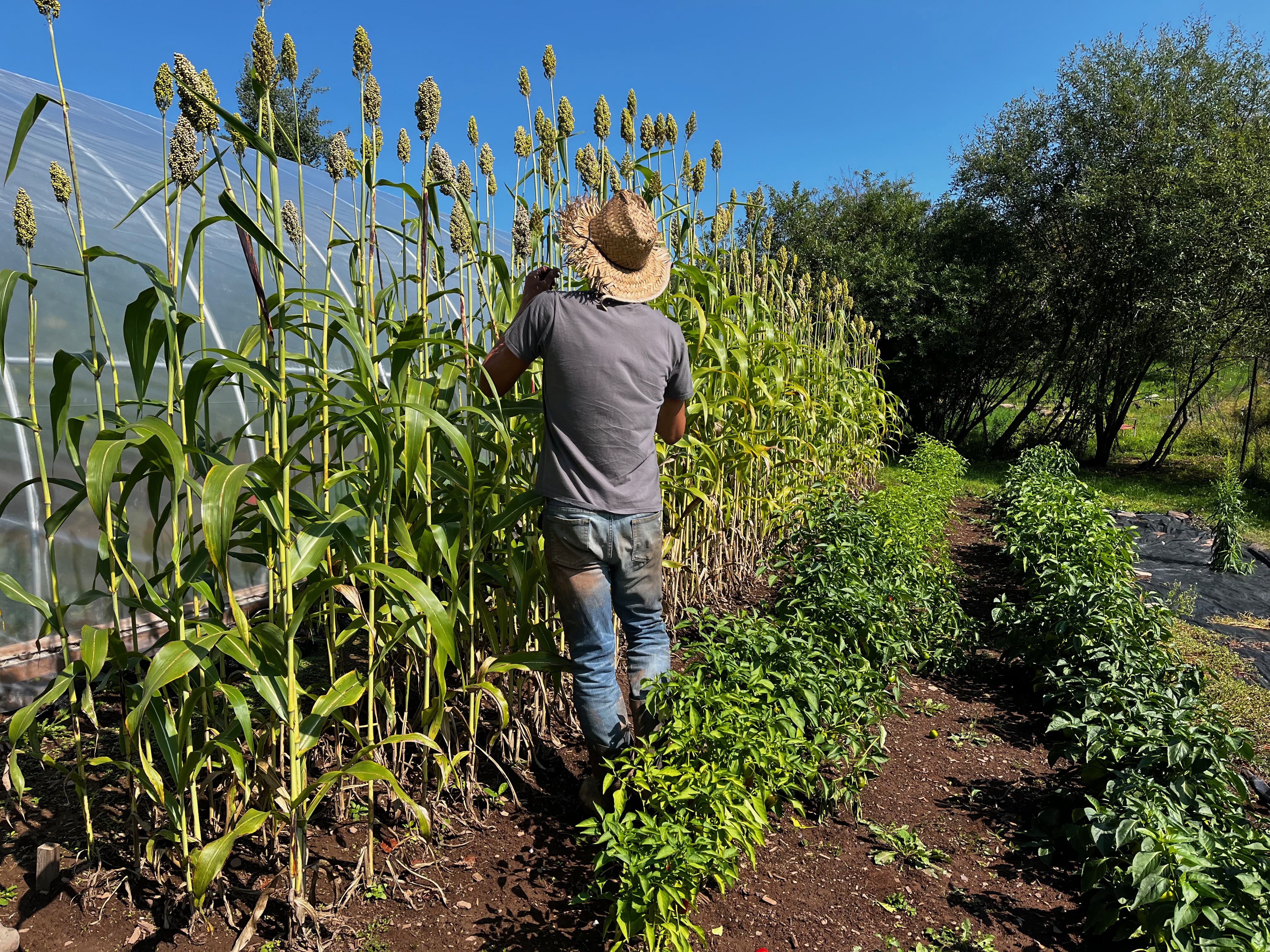 Tyler of Mossy Stone Farm inspecting sorghum midseason in 2022.
Tyler of Mossy Stone Farm inspecting sorghum midseason in 2022.
Ryan of Zena Farmstead running Microbiometer test on his farm with Koji, 2022.
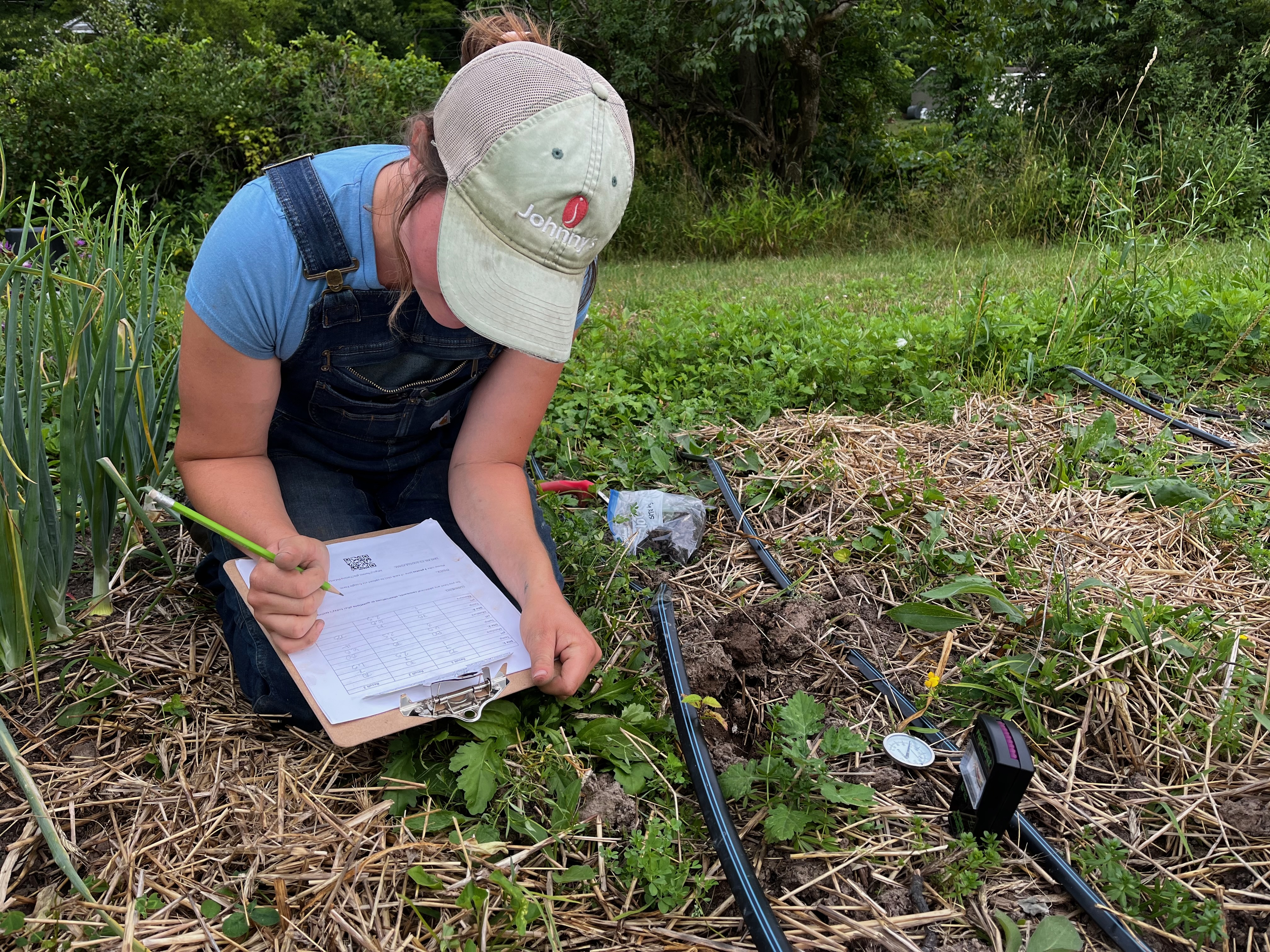 Christine of Nimble Roots Farm collecting soil data, 2022.
Christine of Nimble Roots Farm collecting soil data, 2022.Carbon Sponge Affiliates in NYC was active for two seasons (2020-2021). The group included: Bronx River Foodway (Bronx), GrowNYC Teaching Garden (Governor’s Island), NYU’s Urban Farm Project (Manhattan), Pioneer Works (Brooklyn), Prospect Farm (Brooklyn), and Red Hook Farms (Brooklyn). Over the two years, the Affiliates members in NYC tested the Carbon Sponge Kit and data collection protocols in their existing green spaces, discussed ecological farming practices as they pertain to an urban context, and analyzed results together.
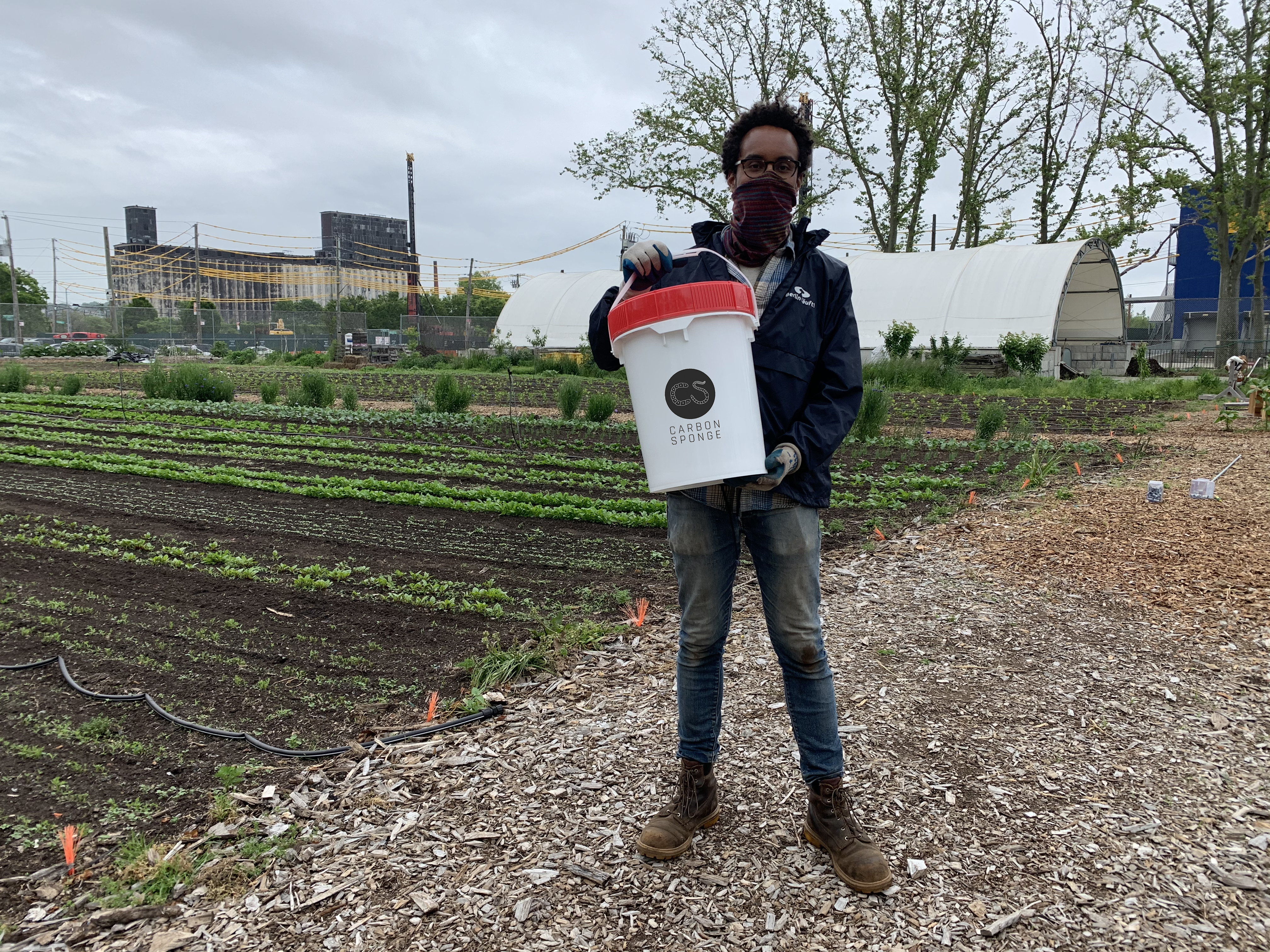 Farmer Brendan at Red Hook Farms, 2020.
Farmer Brendan at Red Hook Farms, 2020.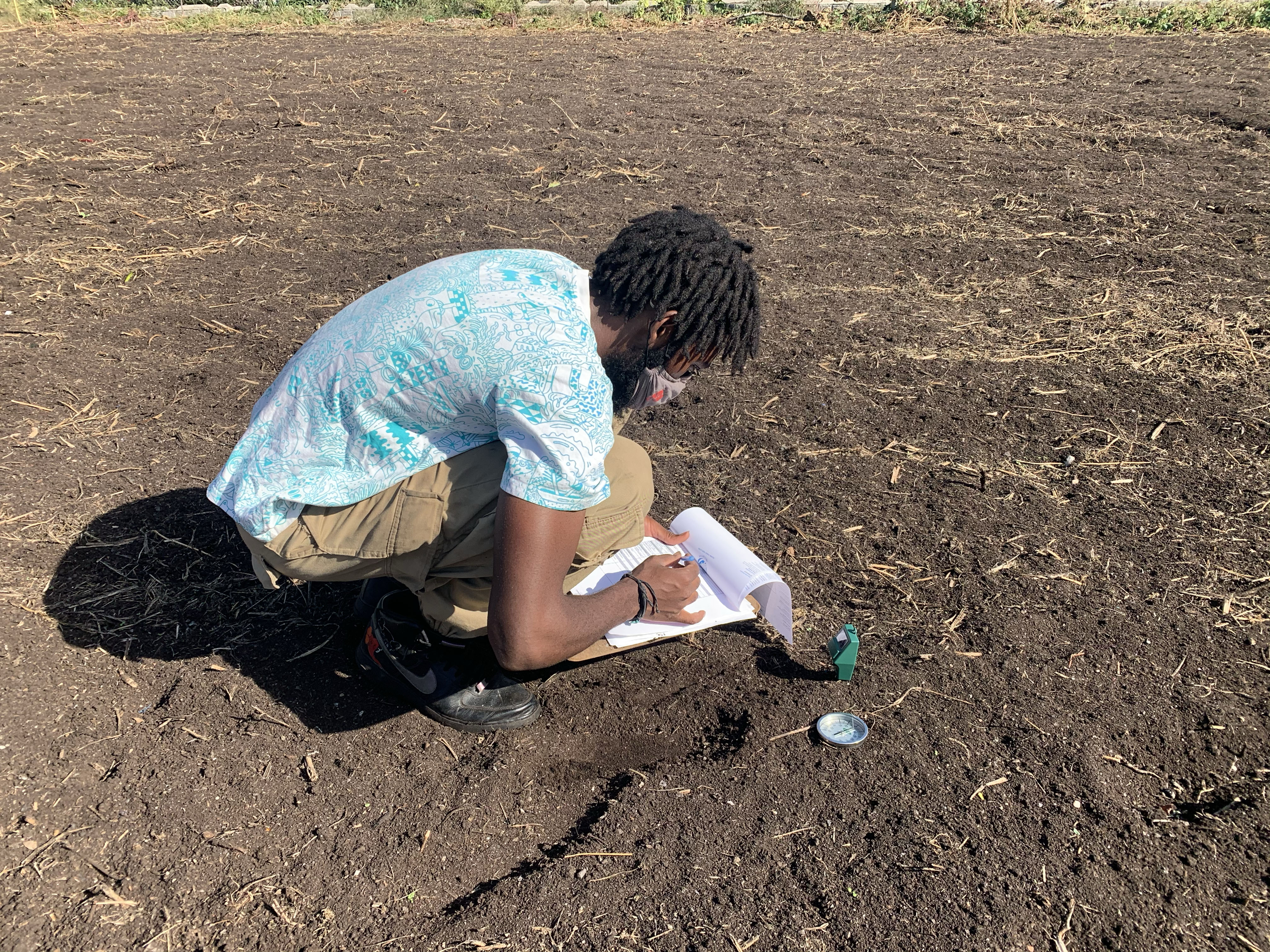 Farmer Justin at Red Hook Farms collecting soil data, 2020.
Farmer Justin at Red Hook Farms collecting soil data, 2020.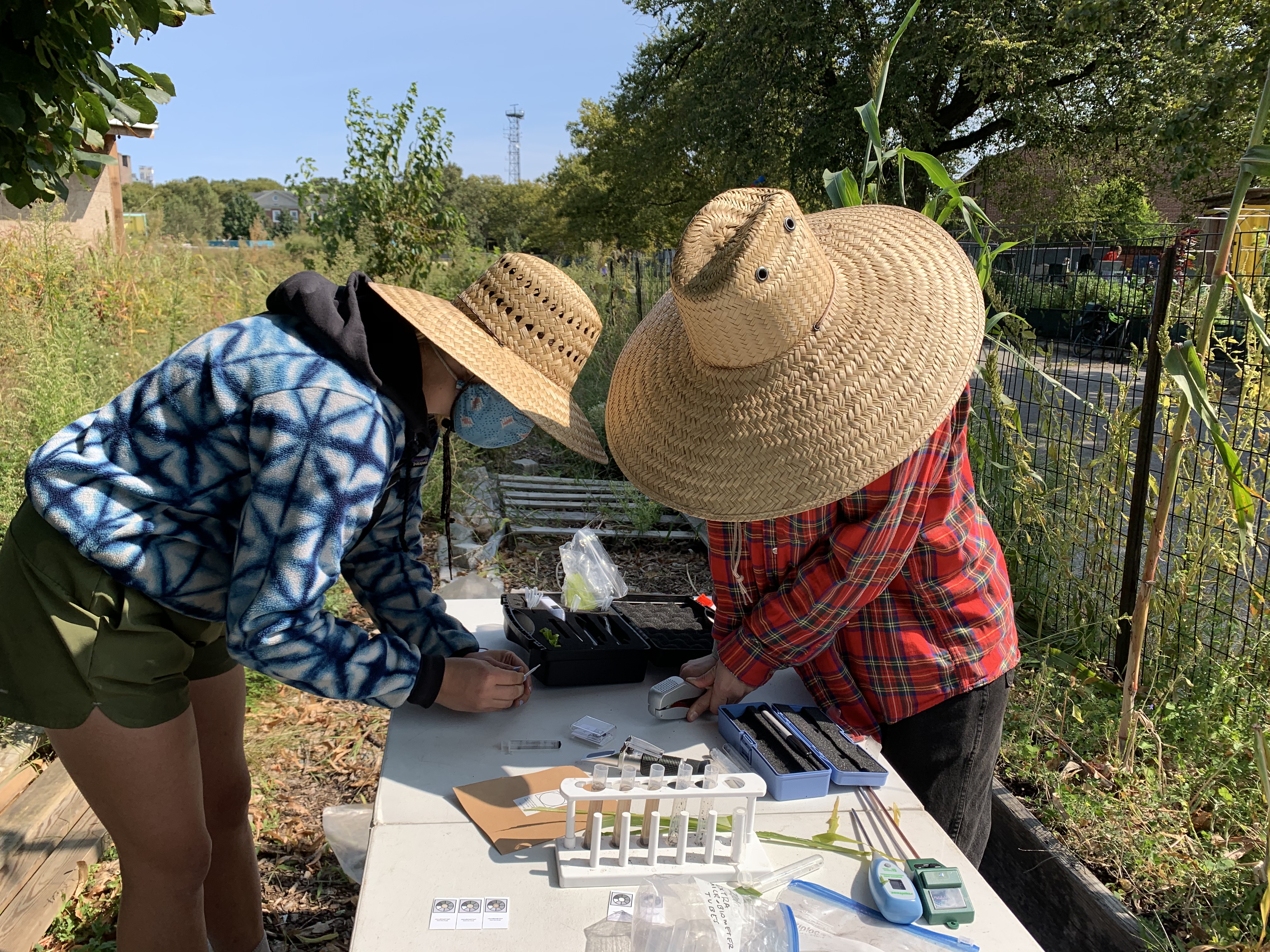 GrowNYC Affiliates testing with the kit on Governors Island, 2021.
GrowNYC Affiliates testing with the kit on Governors Island, 2021.